President Trump raised tariffs on $200 billion worth of Chinese goods from 10 percent to 25 percent on Friday, and Monday morning China retaliated by raising its own tariffs on $60 billion of U.S. goods from 5 and 10 percent to four categories of 5, 10, 20 and 25 percent.
The U.S. tech industry immediately condemned the renewed trade spat, re-stating their arguments that tariffs will decimate American jobs, slash U.S. tech profits, and deliver a gut punch to GDP.
But despite the tech industry’s concerns, the data doesn’t align with their narrative.
The Internet Association — a tech trade group representing Silicon Valley heavyweights like Amazon, Facebook, Google, Microsoft and Twitter — told Politico the tariffs will “limit internet companies’ access to critical components, and hit at the heart of how the sector creates jobs and contributes to a $172 billion digital trade surplus.”
In an April 22 letter to President Trump, the IA added, “As our coalition has made clear since the trade war began, tariffs are taxes that American businesses and consumers pay. To date, Americans have paid over $21 billion in taxes due to the imposition of new tariffs. Furthermore, every single second the tariffs remain in place, Americans are paying over $1,500 in added tariffs, and those figures don’t include the impact of retaliatory tariffs on U.S. farmers, manufacturers and exporters. These taxes and the uncertainty they’ve created have resulted in layoffs, deferred investments and price increases in every corner of the country. Our campaign has shared over 500 stories of American businesses and workers negatively impacted by the trade war.”
In telecom, industry representatives repeat the same concerns. The Information Technology Industry Council (ITI) said in a May 10 statement that “while we appreciate the administration’s commitment to addressing China’s unfair tech trade policies and practices, this trade conflict has taken a significant toll on U.S. businesses, workers, and consumers. The increase to 25 percent duties on the $200 billion tranche of Chinese imports will raise that toll. This specific tariff increase will affect every day telecommunications equipment like modems and routers that help Americans connect to the internet and with each other. Increased tariffs on hardware components also mean that companies large and small will find it more difficult to use digital and cost-saving solutions in their daily business.”
The Telecommunications Industry Association (TIA) also released a very similar statement and Federal Communications Commission’s Jessica Rosenworcel tweeted on Friday that “The tariffs that go into effect today are a 25% tax on the future of technology. All the building blocks of 5G wireless and the internet of things — from modems to antennas to semiconductors — are subject to this new tax. It’s not good–for consumers, innovation or US leadership.”
But think tanks like the Brookings Institution, which collect and study economic data, still say it’s “hard to conclude” the tariffs are causing any serious damage to the economy, partly because the tariffs haven’t been in effect long enough to really quantify and qualify the data.
Brookings and Goldman Sachs also point out that even with the data on jobs and investment we do have, we don’t know how other factors are affecting it, so it’s difficult to pin any particular problems on tariffs, because the effects of “tariffs are never simple.”
Writing for the Mercatus Center at George Mason University, Andrea O’Sullivan pointed out in a September 2018 blog post that because the Big Tech companies have thicker profit margins, they will likely stomach the tariffs much more easily than small businesses.
“Think about the U.S. firms that assemble parts and components that the bigger guys use, or smaller consumer product manufacturers and service providers,” O’Sullivan wrote. “These companies can have thinner profit margins, and a 25 percent tax on Chinese imports could spell disaster for their firms.”
The R Street Institute’s Technology and Innovation Policy Team Manager Tom Struble also said the tariffs will likely hurt small businesses more than big ones, especially in the capex-heavy telecom industry.
But history shows that long-term, tariffs don’t have quite the catastrophic effect trade groups and big business say they do. President George W. Bush’s 30 percent tariffs on steel in 2002, for example, resulted in a small dip in GDP, barely affecting an overall upward trajectory in economic growth.
A 2015 study from the University of California found that trade agreements don’t necessarily benefit all parties, but the tech industry and economic experts argue that while U.S.-China trade relationship needs to be remade, tariffs are not the answer.

